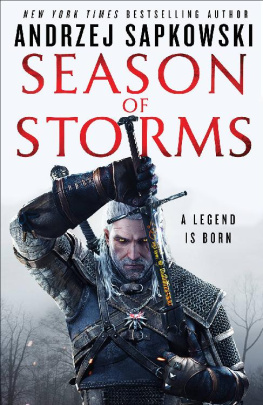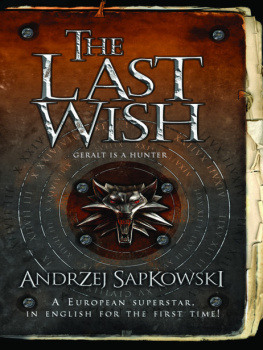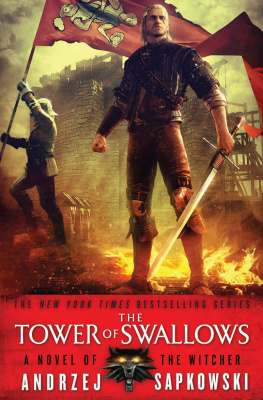orbitbooks.net
orbitshortfiction.com
In accordance with the U.S. Copyright Act of 1976, the scanning, uploading, and electronic sharing of any part of this book without the permission of the publisher is unlawful piracy and theft of the authors intellectual property. If you would like to use material from the book (other than for review purposes), prior written permission must be obtained by contacting the publisher at permissions@hbgusa.com. Thank you for your support of the authors rights.
Blood on your hands, Falka,
Blood on your dress.
Burn, burn, Falka, and die,
Die in agony for your crimes!
Vedymins, called witchers among the Nordlings (q.v.), a mysterious and elite caste of warrior-priests, probably an offshoot of the druids (q.v.). In the folk consciousness, they are endowed with magical powers and superhuman abilities; v. were said to fight evil spirits, monsters and all manner of dark forces. In reality, since they were unparalleled in their ability to wield weapons, v. were used by the rulers of the north in the tribal fighting they waged with each other. In combat v. fell into a trance, brought on, it is believed, by autohypnosis or intoxicating substances, and fought with pure energy, being utterly invulnerable to pain or even grave wounds, which reinforced the superstitions about their superhuman powers. The theory, according to which v. were said to have been the products of mutation or genetic engineering, has not found confirmation. V. are the heroes of numerous Nordling tales (cf. F. Delannoy, Myths and Legends of the Nordlings).
Effenberg and Talbot
Encyclopaedia Maxima Mundi, Vol. XV
When talking to youngsters entering the service, Aplegatt usually told them that in order to make their living as mounted messengers two things would be necessary: a head of gold and an arse of iron.
A head of gold is essential, Aplegatt instructed the young messengers, since in the flat leather pouch strapped to his chest beneath his clothing the messenger only carries news of less vital importance, which could without fear be entrusted to treacherous paper or manuscript. The really important, secret tidingsthose on which a great deal dependedmust be committed to memory by the messenger and only repeated to the intended recipient. Word for word; and at times those words are far from simple. Difficult to pronounce, let alone remember. In order to memorise them and not make a mistake when they are recounted, one has to have a truly golden head.
And the benefits of an arse of iron, oh, every messenger will swiftly learn those for himself. When the moment comes for him to spend three days and nights in the saddle, riding a hundred or even two hundred miles along roads or sometimes, when necessary, trackless terrain, then it is needed. No, of course you dont sit in the saddle without respite; sometimes you dismount and rest. For a man can bear a great deal, but a horse less. However, when its time to get back in the saddle after resting, its as though your arse were shouting, Help! Murder!
But who needs mounted messengers now, Master Aplegatt? young people would occasionally ask in astonishment. Take Vengerberg to Vizima; no one could knock that off in less than fouror even fivedays, even on the swiftest steed. But how long does a sorcerer from Vengerberg need to send news to a sorcerer from Vizima? Half an hour, or not even that. A messengers horse may go lame, but a sorcerers message always arrives. It never loses its way. It never arrives late or gets lost. Whats the point of messengers, if there are sorcerers everywhere, at every kingly court? Messengers are no longer necessary, Master Aplegatt.
For some time Aplegatt had also been thinking he was no longer of any use to anyone. He was thirty-six and small but strong and wiry, wasnt afraid of hard work and hadnaturallya head of gold. He could have found other work to support himself and his wife, to put a bit of money by for the dowries of his two as yet unmarried daughters and to continue helping the married one whose husband, the sad loser, was always unlucky in his business ventures. But Aplegatt couldnt and didnt want to imagine any other job. He was a royal mounted messenger and that was that.
And then suddenly, after a long period of being forgotten and humiliatingly idle, Aplegatt was once again needed. And the highways and forest tracks once again echoed to the sound of hooves. Just like the old days, messengers began to travel the land bearing news from town to town.
Aplegatt knew why. He saw a lot and heard even more. It was expected that he would immediately erase each message from his memory once it had been given, that he would forget it so as to be unable to recall it even under torture. But Aplegatt remembered. He knew why kings had suddenly stopped communicating with the help of magic and sorcerers. The news that the messengers were carrying was meant to remain a secret from them. Kings had suddenly stopped trusting sorcerers; stopped confiding their secrets in them.
Aplegatt didnt know what had caused this sudden cooling off in the friendship between kings and sorcerers and wasnt overly concerned about it. He regarded both kings and magic-users as incomprehensible creatures, unpredictable in their deedsparticularly when times were becoming hard. And the fact that times were now hard could not be ignored, not if one travelled across the land from castle to castle, from town to town, from kingdom to kingdom.
There were plenty of troops on the roads. With every step one came across an infantry or cavalry column, and every commander you met was edgy, nervous, curt and as self-important as if the fate of the entire world rested on him alone. The cities and castles were also full of armed men, and a feverish bustle went on there, day and night. The usually invisible burgraves and castellans now ceaselessly rushed along walls and through courtyards, angry as wasps before a storm, yelling, swearing and issuing orders and kicks. Day and night, lumbering columns of laden wagons rolled towards strongholds and garrisons, passing carts on their way back, moving quickly, unburdened and empty. Herds of frisky three-year-old mounts taken straight out of stables kicked dust up on the roads. Ponies not accustomed to bits nor armed riders cheerfully enjoyed their last days of freedom, giving stable boys plenty of extra work and other road users no small trouble.
To put it briefly, war hung in the hot, still air.
Aplegatt stood up in his stirrups and looked around. Down at the foot of the hill a river sparkled, meandering sharply among meadows and clusters of trees. Forests stretched out beyond it, to the south. The messenger urged his horse on. Time was running out.
Hed been on the road for two days. The royal order and mail had caught up with him in Hagge, where he was resting after returning from Tretogor. He had left the stronghold by night, galloping along the highway following the left bank of the Pontar, crossed the border with Temeria before dawn, and now, at noon of the following day, was already at the bank of the Ismena. Had King Foltest been in Vizima, Aplegatt would have delivered him the message that night. Unfortunately, the king was not in the capital; he was residing in the south of the country, in Maribor, almost two hundred miles from Vizima. Aplegatt knew this, so in the region of the White Bridge he left the westward-leading road and rode through woodland towards Ellander. He was taking a risk. The Scoiatael1 continued to roam the forests, and woe betide anyone who fell into their hands or came within arrowshot. But a royal messenger had to take risks. Such was his duty.









